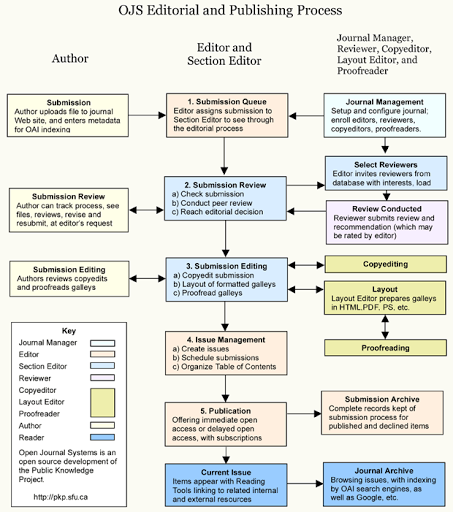| INFORMATION |
|---|
| How to Register |
| POLICIES |
| SUBMISSIONS |
| ARTICLE TEMPLATE |
|---|
| TOOLS |
|---|
| VISITORS |
|---|
WAWASAN: Jurnal Kediklatan Balai Diklat Keagamaan Jakarta accepts all research and scientific papers from researcher, academics, training participants, practitioners who work in public services, religion, and education issues which may include to these issues:
The article submitted to this online journal will be peer-reviewed at least 2 (two) reviewers. Reviewers are unaware of the information of the authors and authors are also unaware of the information of reviewers (double-blind review). The accepted research article will be available online following the journal peer-reviewing process.
WAWASAN: Jurnal Kediklatan Balai Diklat Keagamaan Jakarta provides immediate open access to its content on the principle that making research freely available to the public to supports a greater global exchange of knowledge. This journal is an open-access journal which means that all content is freely available without charge to users or institutions. Users are allowed to read, download, copy, distribute, print, search, or link to full-text articles in WAWASAN: Jurnal Kediklatan Balai Diklat Keagamaan Jakarta without asking prior permission from the publisher or author.
WAWASAN: Jurnal Kediklatan Balai Diklat Keagamaan Jakarta utilizes the LOCKSS system to create a distributed archiving system among participating libraries and permits those libraries to create permanent archives of the journal for purposes of preservation and restoration. More..
The articles published in Wawasan: Jurnal Kediklatan Balai Diklat Keagamaan Jakarta will be considered to retract in the publication if:
The mechanism of retraction follow the Retraction Guidelines of Committee on Publication Ethics (COPE) which can be accessed at retraction-guidelines-cope.pdf
Peer-reviewed is an essential building block in the development of a coherent and respected network of knowledge. It is a direct reflection of the quality of the work of the authors and the institutions that support them. Peer-reviewed articles support and embody the scientific method. It is therefore important to agree upon standards of expected ethical behavior for all parties involved in the act of publishing: the author, the journal editor, the peer reviewer, the publisher, and the society.
Jakarta Education and Religion Training Office (Balai Diklat Keagamaan Jakarta) as the publisher of WAWASAN: Jurnal Kediklatan Balai Diklat Keagamaan Jakarta takes its duties of guardianship over all stages of publishing seriously and we recognize our ethical and other responsibilities. We are committed to ensuring that advertising, reprint or other commercial revenue has no impact or influence on editorial decisions.
Duties of Editors
Duties of Reviewers
Duties of Authors
WAWASAN: Jurnal Kediklatan Balai Diklat Keagamaan Jakarta wants to ensure that all authors are careful and comply with standards for academic integrity, particularly on the issue of plagiarism.
Before submitting articles to reviewers, those are first checked for similarity/plagiarism tool, by a member of the editorial team. The papers submitted to WAWASAN: Jurnal Kediklatan Balai Diklat Keagamaan Jakarta must have a similarity level less than 20%.
Plagiarism is the exposure of another person’s thoughts or words as though they were your own, without permission, credit, or acknowledgment, or because of failing to cite the sources properly. Plagiarism can take diverse forms, from literal copying to paraphrasing the work of another. In order to properly judge whether an author has plagiarized, we emphasize the following possible situations:
WAWASAN: Jurnal Kediklatan Balai Diklat Keagamaan Jakarta takes academic integrity seriously, and the editors reserve the right to withdraw acceptance from a paper found to violate any of the standards set out above.
For further information, potential authors can contact the editorial office at email ikaberdiati@gmail.com
WAWASAN: Jurnal Kediklatan Balai Diklat Keagamaan Jakarta is a journal published online and printed twice a year in the middle of the year (June) and at the end of the year (December). There are at least 16 articles published per year.
WAWASAN: Jurnal Kediklatan Balai Diklat Keagamaan Jakarta charges the following author fees.
Article Submission Charges: 0.00 (IDR)
Article Processing Charges: 0.00 (IDR)
Article Publication Charges: 0.00 (IDR)
Every article submitted to WAWASAN: Jurnal Kediklatan Balai Diklat Keagamaan Jakarta will not have any 'Publication Fee'. This includes submitting, peer-reviewing, editing, publishing, maintaining and archiving, and allows immediate access to the full text versions of the articles.

Picture Source: https://andykamt.com/cara-cepat-implementasi-open-journal-system-ojs-untuk-jurnal-ilmiah/
Wawasan: Jurnal Kediklatan Balai Diklat Keagamaan Jakarta (p-ISSN: 2548-9232, e-ISSN 2775-3573) indexed by:
Wawasan: Jurnal Kediklatan Balai Diklat Keagamaan Jakarta is published by Balai Pendidikan dan Pelatihan Keagamaan Jakarta
Copyright: Jurnal Kediklatan Balai Diklat Keagamaan Jakarta (p-ISSN: 2548-9232, e-ISSN 2775-3573).
